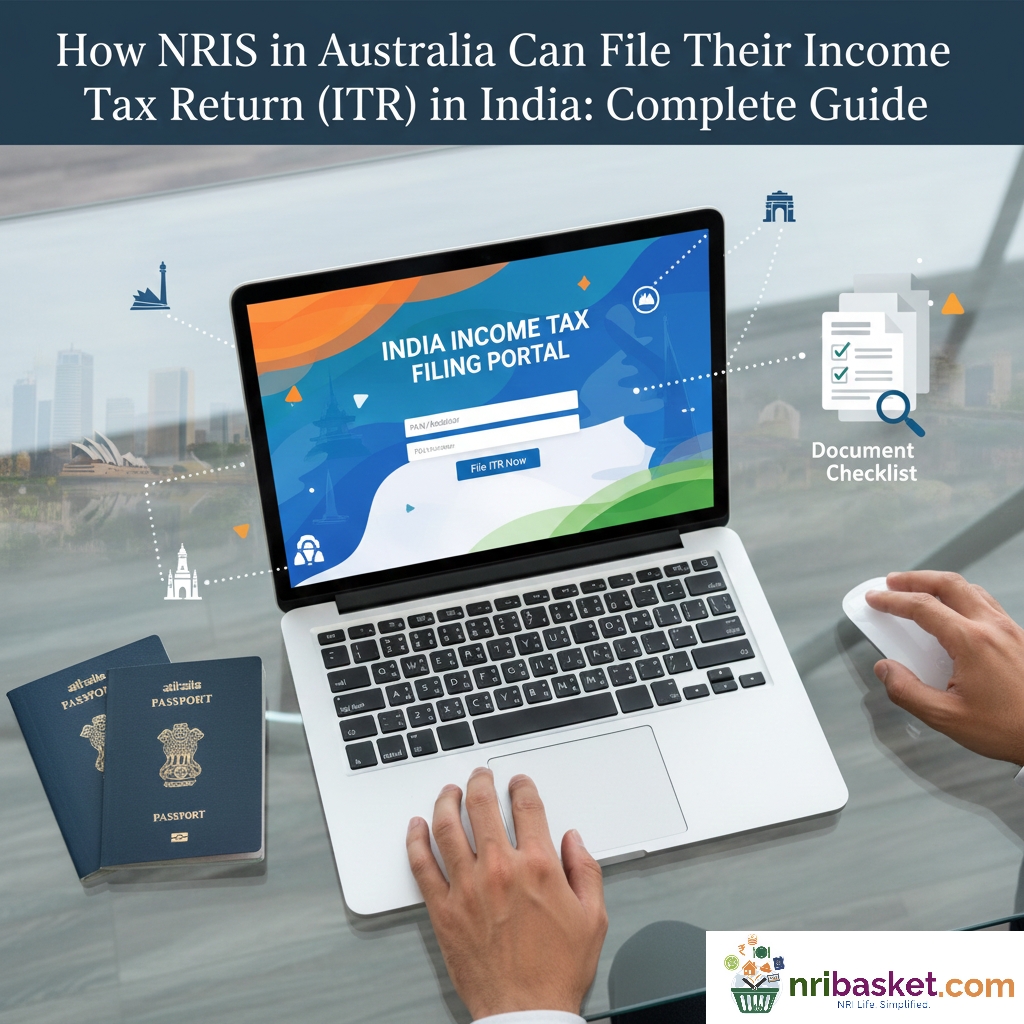
Oplus_16908288
Filing your Indian Income Tax Return (ITR) while living and working in Australia is completely possible for NRIs. Whether you have rental income, interest from NRO accounts, or capital gains, you must report it correctly. This FAQ guide explains everything in simple language so you can file your ITR smoothly from Australia.
Below is your complete set:
Long Answer: India’s income tax portal allows complete online filing. As long as you have your PAN, bank details, and Indian income records, you can file your return from Australia without visiting India.
Long Answer: NRIs must file ITR if they earn rent, interest, capital gains, or any taxable income in India. Australian salary is not taxed in India, but Indian income must be reported.
Long Answer: Any income generated within India—like NRO interest, sale of property, dividends, mutual fund gains, or business income—requires an ITR filing if taxable or if TDS refund is needed.
Long Answer: Banks deduct 30% TDS on NRO interest. You must file ITR to claim refund or to declare actual taxable income. Filing ensures compliance and avoids notices.
Long Answer: NRIs can file ITR using PAN only. Aadhaar is optional. The income tax portal allows login via PAN or foreign mobile/email-based OTP.
Long Answer: Keep rent receipts, interest certificates, sale deeds, TDS certificates, NRO bank statements, Form 26AS, AIS, and proof of DTAA documents if claiming tax benefits.
Long Answer: NRIs with salary abroad and Indian rental/interest income typically use ITR-2. If you have business income in India, you may need ITR-3.
Long Answer: Once you qualify as an NRI under Indian tax law, your foreign salary is not taxable in India. Only Indian income is taxed and must be reported.
Long Answer: NRIs can verify returns using netbanking, DSC (digital signature), or EVC via email/foreign mobile. No physical signature is needed.
Long Answer: The Income Tax Department sends refunds only to active Indian bank accounts linked with PAN and validated on the portal. NRIs typically use NRO/NRE accounts.
Long Answer: A digital signature (DSC) is optional. You can choose EVC methods like OTP on email or bank login to verify your return easily from Australia.
Long Answer: If TDS was deducted (like 30% on NRO interest), filing ITR becomes necessary to get a refund even if total income is below the threshold.
Long Answer: File ITR-2, declare real income, attach correct TDS entries (Form 26AS/AIS), and the refund will be issued to your Indian bank account.
Long Answer: NRIs in Australia can apply lower TDS rates (15% on interest) and avoid double taxation. You must submit TRC and Form 10F for DTAA benefits.
Long Answer: NRIs follow the same deadlines as residents unless the government extends it. Returns filed after the deadline may attract late fees.
Long Answer: Belated returns can be filed until 31st December of the same financial year but may carry penalties up to ₹5,000 and interest on any tax due.
Long Answer: If your Indian income (like rent or capital gains) creates more than ₹10,000 in tax liability beyond TDS, advance tax is necessary to avoid interest.
Long Answer: Equity and debt funds have different tax rules. Gains are taxed in India, and NRIs must declare them in their ITR and also in Australia under global income rules.
Long Answer: Interest earned from NRE accounts is exempt from Indian tax if you maintain NRI status. You may still need to declare it in Australia.
Long Answer: From login to verification, everything is digital. You can file, verify, and receive refunds without needing to travel.
Long Answer: NRIs can claim 80C deductions for LIC, PPF (existing accounts), home loan principal, and tuition fees. Not all resident deductions apply to NRIs.
Long Answer: Rent is taxable in India after 30% standard deduction. If TDS is deducted by the tenant, filing ITR ensures accurate tax calculation and refunds where applicable.
Long Answer: Only resident taxpayers must disclose foreign assets. NRIs are exempt since their global income is not taxable in India.
Long Answer: The portal allows OTP delivery to foreign emails and mobile numbers for login and e-verification. PAN must be linked to a valid contact.
Long Answer: Failure to file can cause loss of refunds, notices from the tax department, and penalties up to ₹10,000 depending on income level.
Long Answer: You can authorize any family member or CA in India to file on your behalf. However, the verification must still be done by you (online).
Long Answer: NRO earnings attract 30% TDS. Filing ITR is needed to claim refunds, especially under DTAA where tax rate may drop to 15%.
Long Answer: Long-term and short-term gains have different tax rates. TDS is deducted at the time of sale, and filing ITR ensures correct calculation and refunds on excess TDS.
Long Answer: If you made a mistake, you can file a revised ITR before December 31. Verification is also online through the portal.
Long Answer: Refund timelines vary depending on processing speed, bank validation, and TDS matching. Validating your NRO/NRE bank account on the portal speeds up refunds.
File ITR from Australia, NRI income tax filing India, how NRIs file ITR abroad, ITR for Australian residents India, NRO TDS refund Australia, Indian income tax for NRIs, DTAA India Australia, file tax return India from overseas, NRI rental income tax India, NRI capital gains tax India




